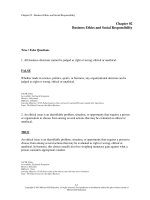Lecture Business: A changing world - Chapter 12: Customer-driven marketing
Bạn đang xem bản rút gọn của tài liệu. Xem và tải ngay bản đầy đủ của tài liệu tại đây (1.48 MB, 23 trang )
Chapter Twelve
CustomerDriven
Marketing
© 2003 McGrawHill Ryerson Limited
The Exchange Process: Giving Up
One Thing in Return for Another
Something of Value (money,
12-1
Buyer
(goods,
services,
ideas)
credit,
labour,
goods)
Seller
Something of Value
© 2003 McGrawHill Ryerson Limited
Marketing Creates Utility
12-2
•
•
•
•
Place utility
Time utility
Ownership utility
Form utility
© 2003 McGrawHill Ryerson Limited
Functions of Marketing
•
•
•
•
12-3
Buying
Selling
Transporting
Storing
© 2003 McGrawHill Ryerson Limited
•
•
•
•
Grading
Financing
Marketing research
Risk taking
The Breakdown of the
Marketing Concept
12-4a
© 2003 McGrawHill Ryerson Limited
The Breakdown of the
Marketing Concept
12-4b
© 2003 McGrawHill Ryerson Limited
Market/Target Market
A market is a group of people who
have a need, purchasing power, and the
desire and authority to spend money on
goods, services, and ideas.
12-5
A target market is a more specific
group of consumers on whose needs
and wants a company focuses its
marketing efforts.
© 2003 McGrawHill Ryerson Limited
Generational Marketing
Canada’s oldest citizens
Baby boomers
12-6
Gen Xers
(born between 19661980)
Generation Y
© 2003 McGrawHill Ryerson Limited
the generation of great hope
desire products that reward them for hard
work
the generation born in great economic
prosperity
desire products that save time or simplify
living
desire products that fit with the image of
self they are creating
the most privileged generation
desire products that are hightech and
authentic and nontraditional shopping venues
Marketing to Different
Generations (or target markets)
What’s Cool?
12-7
According to Boomers
Lexus LS 400
Gap
Estee Lauder
Palm Pilot
Coke
Nikes
© 2003 McGrawHill Ryerson Limited
According to Generation Y
Jeep Wrangler
Delia’s
Hard Candy
Motorola Flex Pagers
Mountain Dew
Vans
Source: Ellen Neuborne and Kathleen Kerwin, “Generation Y,”
Business Week, February 15, 1999, pp. 8283.
Target Market Strategies
TotalMarket Approach
Company
12-8
Single Marketing Strategy
Total Target Market
Concentration Approach
Single Marketing Strategy
Company
Single Target Market
Multisegment Approach
Company
Marketing Strategy 1
Marketing Strategy 2
© 2003 McGrawHill Ryerson Limited
Multiple Target Markets
Bases for Segmenting
Markets
•
•
•
•
12-9
Demographics
Geographic factors
Psychographics
Behavioristic characteristics
© 2003 McGrawHill Ryerson Limited
The Marketing Mix: Product, Price,
Promotion, and Distribution
12-10
Product
Promotion
Customer
Distribution
© 2003 McGrawHill Ryerson Limited
Price
Buying Behavior
• Psychological variables
12-11
– perception
– motivation
– learning
• Social variables
–
–
–
–
social roles
reference groups
social classes
culture
© 2003 McGrawHill Ryerson Limited
Trends in Buying Behavior
12-12
Arrivals
Departures
Onearm packs/hipsacks
Pink
Krav Maga
Lowriders
Bistros
Tai Bo
Anatomical wrap soles
Scalp jewels
Manic Street Preachers/Air
Ostrich burgers
Floating necklaces
Backpacks
Gray
Pilates
Motorcycles
Clubs
Tai Chi
Platforms
Glitter
The Verve
Turkey burgers
Silver spring bracelets
© 2003 McGrawHill Ryerson Limited
Source: />ad/99_ad/9901_ad/ad990106e.htm, March 15, 1999.
Who’s Buying Beetles?
12-13
Age of head of household:
1824
2534
3544
4554
5564
6574
75 and over
2%
14%
30%
35%
13%
5%
1%
© 2003 McGrawHill Ryerson Limited
Source: USA Today, February 2, 1999, p. B3.
A Marketing Mix and the Marketing
Environment
Political, Legal, and
Regulatory
Forces
12-14
Product
Promotion
Technological
Forces
© 2003 McGrawHill Ryerson Limited
Social
Forces
Customer
Distribution
Marketing Environment
Price
Competitive
and Economic
Forces
Marketing Environment Trends
Marriage rate dropping
68%
12-15
1998
Decline since 1970:
1970
1
56%
The number of
adults married and living
with their spouse declined
to an alltime low in 1998
due to increasing levels of
divorced and never
married adults.
1
White 59%, hispanic 51%,
black 35% (only groups broken out)
Source: Census Bureau
24%
19%
10%
3%
Married,
with
spouse
© 2003 McGrawHill Ryerson Limited
Divorced
Never
married
7% 8%
Married,
separated
3% 1%
Widowed
Source: USA Today, March 3, 1999, p. A1.
12-16
Technological
Forces
(bluefly.com Online Outlet)
© 2003 McGrawHill Ryerson Limited
Solve the Dilemma
12-17
a. What do you think were the main concerns with the
Olympus 2door sports coupe? Is there a market for a
2seat, $32,000 sports car when the Miata sells for
significantly less?
b. Evaluate the role of the marketing mix in the
Olympus introduction.
c. What are some of the marketing strategies auto
manufacturers use to stimulate sale of certain makes
of automobiles?
© 2003 McGrawHill Ryerson Limited
Explore Your Career Options
12-18
How will a career in marketing be
enhanced by knowledge about customer
buying behaviour and customer service?
© 2003 McGrawHill Ryerson Limited
Additional Discussion
Questions and Exercises
12-19
1. Utility is the ability of a product to satisfy human needs and
wants. What are the four kinds of utility?
2. Why are intermediaries helpful in distribution?
3. What are some different forms of promotion?
4. What is the difference between primary data and secondary
data?
5. What are some sources for obtaining secondary data?
© 2003 McGrawHill Ryerson Limited
Chapter 12 Quiz
12-20a
1. When a business segments markets on the basis of personality characteristics,
motives, and life styles, that segmentation is based on
a. demographics.
b. geographic factors.
c. psychographics.
d. behaviouristic characteristics.
2. The act of giving up one thing in return for something else is
a. marketing.
b. utility.
c. an exchange.
d. promotion.
© 2003 McGrawHill Ryerson Limited
Chapter 12 Quiz
12-20b
3. The psychological factor described as “changes in a person’s
behaviour based on” is termed:
a. perception.
b. motivation.
c. personality.
d. learning.
4. In developing a marketing mix, what should be the central focus of all
marketing activities?
a. price
b. buyer or customer
c. product
d. promotion
© 2003 McGrawHill Ryerson Limited









